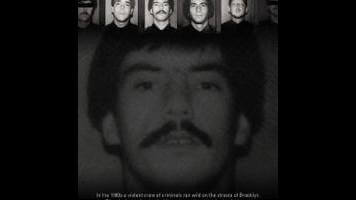Lately, it seems not a day goes by without some report of police corruption or brutality. The image of a cop who, per the motto, protects and serves the public is an increasingly distant ideal. Perhaps it was always this way—granted a position of relative power, it’s difficult to be good and honest, much easier to abuse and exploit. Part of the problem may be the cinematic allure of outlaw cops: On-screen, bad guys are so much more attractive, at least in the moment, and there’s a vicarious thrill to watching a purportedly lawful man contravene his sworn duty. That’s a large part of what makes Tiller Russell’s documentary about the exploits of an infamous NYPD policeman such an engrossing, if never entirely fulfilling, viewing experience.
His name is Michael Dowd, a former patrol officer in the 75th (or “seven five”) precinct that primarily services the Brooklyn neighborhood of East New York. When he came on the job in 1982, East New York was a hotbed of criminal activity and social unrest, as well as a prime location for crack distribution. Cop killings were also prevalent, and the low-30s yearly salary was barely enough for a man with a wife, kids, a mortgage, and expensive tastes to make ends meet. So Dowd ingratiated himself to several local drug dealers, and for nearly a decade ran a profitable racket keeping men he should have been putting behind bars in business.
Dowd is the film’s main interviewee, telling his story with a hyped-up machismo that makes him seem like a Scorsese character come to life. The biggest issue with The Seven Five is that it often feels like it’s mimicking Saint Marty’s stylistic and thematic bag of tricks. Dowd could be kin to The Wolf Of Wall Street’s Jordan Belfort or Goodfellas’ Henry Hill what with his fuck-it-all virility and frequent flashes of regret. Russell also occasionally shoots Dowd from above as he weaves around the room like Raging Bull’s Jake LaMotta; it’s as if he’s sparring with his own memories, trying to justify his actions even as he perfunctorily attempts to repudiate them.
It’s clear Dowd misses the life he led: The $8,000-a-week paydays from drug lords; the red Corvette that he shamelessly drove around as a bird-flipping symbol of his unearned status; even his gleeful temptation of his former partner Kenny Eurell (also one of the film’s talking heads) to break the law alongside him. It would be a lie to say that Dowd isn’t a captivating figure. He spins as mean a yarn as a dive-bar regular, belligerently moaning over past regrets in between beer sips. Yet there’s a pronounced imbalance in how The Seven Five squares his very seductive accounts of criminal wrongdoing (which are jazzed up with a number of frenetic montages and classic rock music cues) with his hollow confessional. His remorse is never as convincing, or resonant, as his I’d-do-it-all-again cockiness.









































